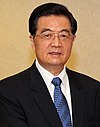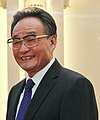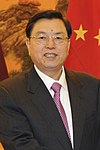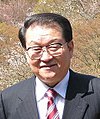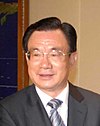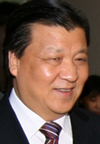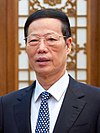
The Politburo Standing Committee (PSC), officially the Standing Committee of the Political Bureau of the Central Committee of the Communist Party of China, is a committee consisting of the top leadership of the Chinese Communist Party (CCP). Historically it has been composed of five to eleven members, and currently has seven members. Its officially mandated purpose is to conduct policy discussions and make decisions on major issues when the Politburo, a larger decision-making body, is not in session. According to the party's constitution, the General Secretary of the Central Committee must also be a member of the Politburo Standing Committee.

The premier of the State Council of the People's Republic of China, commonly called the premier of China, is the head of government of China and leader of the State Council. The premier is the second-highest ranking person in China's political system, under the general secretary of the Chinese Communist Party/president of China, and holds the highest rank in the civil service of the central government.

The Central Military Commission (CMC) is the highest national defense organization in the People's Republic of China, which heads the People's Liberation Army (PLA), the People's Armed Police (PAP), and the Militia of China.

The Foreign Affairs Commission of the Central Committee of the Chinese Communist Party, commonly called the Central Foreign Affairs Commission, is a commission of the Central Committee of the Chinese Communist Party (CCP) that exercises general oversight on matters related to foreign affairs. The main execution body of the commission is the General Office, with the director of the Office being China's top diplomat, currently Wang Yi. Since 1993, the group has been led by the general secretary of the Chinese Communist Party and the premier has served as the deputy leader of the group. It is currently chaired by CCP general secretary Xi Jinping, with premier Li Qiang as its deputy leader.
The 16th National Congress of the Chinese Communist Party was held in Beijing between November 8 and 14, 2002. It was preceded by the 15th National Congress of the Chinese Communist Party. 2,114 delegates and 40 specially invited delegates attended this and elected a 356-member 16th CCP Central Committee, as well as a 121-member Central Commission for Discipline Inspection (CCDI). The Congress marked the nominal transition of power between Jiang Zemin and Hu Jintao, who replaced Jiang as General Secretary, and a newly expanded Politburo Standing Committee line-up. The institutional transition would be completed in state organs by the 2003 National People's Congress in March. Jiang, however, remained head of the Central Military Commission, therefore in practice, the power transition was not complete. The Party National Congress examined and adopted the amendment to the Constitution of the Chinese Communist Party proposed by the 15th CCP Central Committee, and decided to come into force as from the date of its adoption. An amendment to the Constitution was approved the Party National Congress, with Jiang Zemin's signature ideology of "Three Represents" written into it. This congress was succeeded by the 17th National Congress of the Chinese Communist Party.
Hu Qili is a former high-ranking politician of the Chinese Communist Party (CCP). He was the first-ranked secretary of the CCP Secretariat from 1985 to 1989 and a member of the CCP Politburo Standing Committee from 1987 to 1989. In 1989, he was purged for his sympathy toward the students of the 1989 Tiananmen Square protests and his support for General Secretary Zhao Ziyang. However, he was able to get back into politics in 1991. In 2001, he was named chairman of the Soong Ching-ling Foundation.

The government of the People's Republic of China is based on a system of people's congress within the parameters of a Marxism–Leninist state, in which the ruling Chinese Communist Party (CCP) enacts its policies through people's congresses. This system is based on the principle of unitary power, also termed unified state power, in which the legislature, the National People's Congress (NPC), is constitutionally enshrined as "the highest state organ of power." As China's political system has no separation of powers, there is only one branch of government which is represented by the legislature. The CCP through the NPC enacts unified leadership, which requires that all state organs, from the Supreme People's Court to the President of the People's Republic of China, are elected by, answerable to, and have no separate powers than those granted to them by the NPC. The CCP controls appointments in all state bodies through a two-thirds majority in the NPC. The remaining seats are held by nominally independent delegates and eight minor political parties, which are non-oppositional and support the CCP. All government bodies and state-owned enterprises have internal CCP committees that lead the decision-making in these institutions.
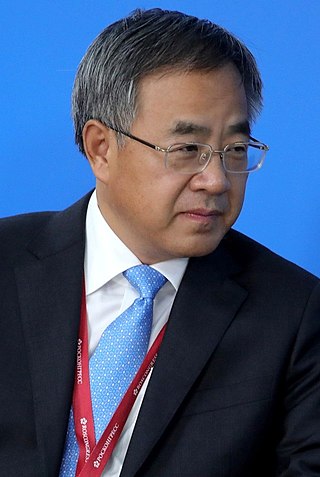
Hu Chunhua is a Chinese politician who is currently a vice chairman of the Chinese People's Political Consultative Conference. He also served as Vice Premier of the People's Republic of China.

The leader of the Central Committee of the Chinese Communist Party is the highest-ranking official and head of the Chinese Communist Party (CCP). Since 1982, the leader of the CCP is equivalent to the office of the General Secretary of the Central Committee. Since its formation in 1921, the leader's post has been titled as Secretary of the Central Bureau (1921–1922), Chairman, and General Secretary.
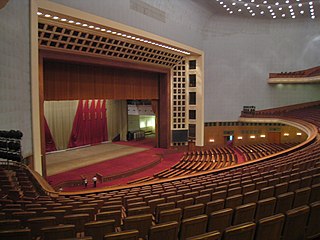
The 17th National Congress of the Chinese Communist Party was held in Beijing, China, at the Great Hall of the People from 15 to 21 October 2007. Congress marked a significant shift in the political direction of the country as CCP General Secretary Hu Jintao solidified his position of leadership. Hu's signature policy doctrine, the Scientific Development Concept, which aimed to create a "Socialist Harmonious Society" through egalitarian wealth distribution and concern for the country's less well-off, was enshrined into the Party Constitution. It was succeeded by the 18th National Congress of the Chinese Communist Party.
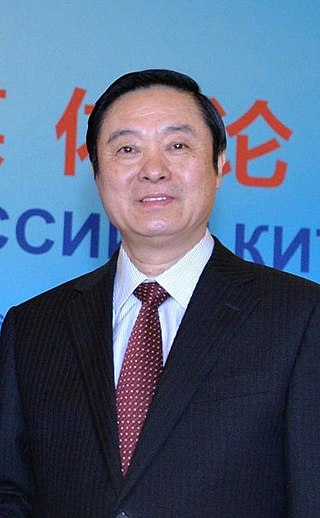
Liu Qibao is a Chinese politician. He was a member of the 18th Politburo of the Chinese Communist Party, a Secretary of the Secretariat of the Chinese Communist Party, as well as the head of the Propaganda Department of the Central Committee. Previously Liu have served as the party chief of the Guangxi Zhuang Autonomous Region and Sichuan province. He also served as one of the vice chairman of 13th Chinese People's Political Consultative Conference between 2018 and 2023.

Wang Chen is a Chinese journalist and politician who served as the first-ranked Vice Chairperson of the Standing Committee of the 13th National People's Congress. He was a member of the 19th Politburo of the Chinese Communist Party. He served as Director of State Council Information Office from 2008 to 2013 and as the Secretary-General of the 12th National People's Congress Standing Committee from 2013 to 2018.
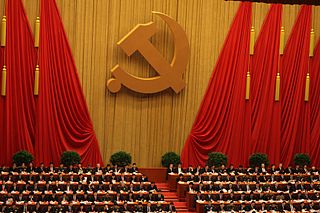
The 18th National Congress of the Chinese Communist Party was held November 8-15, 2012 at the Great Hall of the People. It was preceded by the 17th National Congress of the Chinese Communist Party. Due to term and age limits restrictions, seven of the nine members of the powerful Politburo Standing Committee (PSC) retired during the Congress, including Hu Jintao, who was replaced by Xi Jinping as General Secretary of the Chinese Communist Party. The Congress elected the 18th Central Committee of the Chinese Communist Party, and saw the number of Politburo Standing Committee seats reduced from nine to seven. It was succeeded by the 19th National Congress of the Chinese Communist Party.

The chairman of the Standing Committee of the National People's Congress is the presiding officer of the Standing Committee of the National People's Congress (NPCSC), which is the permanent body of the National People's Congress (NPC), the national legislature of China.
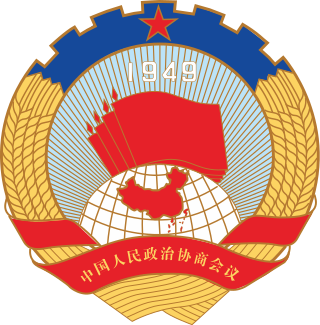
The chairman of the National Committee of the Chinese People's Political Consultative Conference is the leader of the National Committee of the Chinese People's Political Consultative Conference (CPPCC), which is a political advisory body in the People's Republic of China.
The succession of power in China since 1949 takes place in the context of a one-party state under the Chinese Communist Party (CCP). Despite the guarantee of universal franchise in the constitution, the appointment of the Paramount leader lies largely in the hands of his predecessor and the powerful factions that control the Central Committee of the Chinese Communist Party.

The Central Financial and Economic Affairs Commission is a commission of the Central Committee of the Chinese Communist Party in charge of leading and supervising economic work of both the CCP Central Committee and the State Council. The Commission is generally headed by CCP General Secretary or Premier of the State Council.

The Central Comprehensively Deepening Reforms Commission, also translated as the Central Commission for Deepening Reform, is a policy formulation and implementation body set up under the Central Committee of the Chinese Communist Party (CCP) in charge of "Comprehensively Deepening Reforms". These reforms are intended to be even more far-reaching than the previous round of comprehensive Chinese economic reforms initiated by Deng Xiaoping.
Shi Taifeng is a Chinese politician currently serving as the head of the United Front Work Department (UFWD) of the Chinese Communist Party (CCP) and the first-ranking vice chairperson of the Chinese People's Political Consultative Conference (CPPCC). He is additionally a member of the CCP Politburo and a secretary of the CCP Secretariat.








